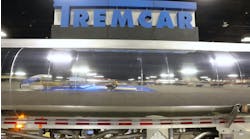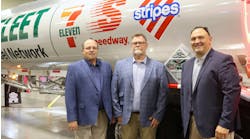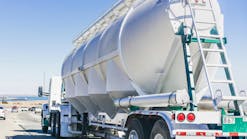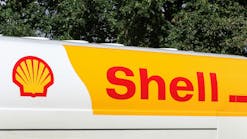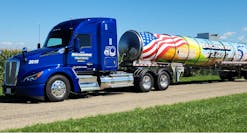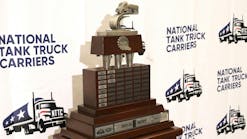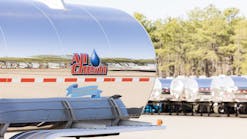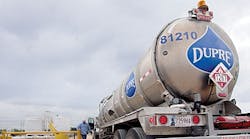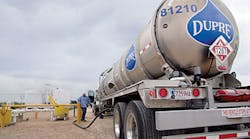Mid-morning on a breezy, warm April day along Farm to Market Highway 624 in the heart of the Eagle Ford oil shale region of South Texas. Three crude oil transports belonging to Dupré Logistics LLC roll eastbound on the way to their delivery destination near Corpus Christi, Texas.
This is a new venture for Dupré Logistics, which was attracted to what is being described as the biggest oil and gas play ever in South Texas. Dupré Logistics currently has 32 crude oil drivers in the Eagle Ford and plans to build up to approximately 75 by the fourth quarter of this year. The carrier recently expanded into a brand new, larger facility in Corpus Christi to support its current petroleum coke operation, as well as the oilfield operation.
“The oil and gas shale activity in the Eagle Ford and other shale regions offers a tremendous opportunity for America to improve its energy independence,” says Tom Voelkel, Dupré Logistics president and chief operating officer. “This is an exciting business that is constantly evolving and changing, and we believe it offers a great opportunity to expand and build our business. We believe the Eagle Ford shale play alone will remain active for at least 20 years, and we see opportunities in other shale plays, as well.
“Dupré Logistics plans a broad expansion into the mid-stream and exploration-and-production sectors of the oil and gas industry. We bring a lot to the table as an energy logistics provider, and we believe we have the capacity to manage the whole logistics process.”
First load
The tank truck carrier began exploring oilfield opportunities in early 2011 and had its first contract in place by November 2011. “We hauled our first load of condensate on November 3, and we are now moving about 100,000 barrels of condensate a month,” says Jim Butler, Dupré Logistics senior project manager.
Jeff Colonna, Dupré Logistics vice-president of operations, adds that Dupré is focusing on customers that see the value of longer-term contracts. “We are looking for partners wanting to build a relationship, rather than a transactional arrangement,” he says. “Partnerships in this growing energy sector have needs that go beyond day-to-day hauling. We believe we have what it takes to meet our clients' needs for transportation that emphasizes safety, quality, collaboration, and scalability. We bring a lot of benefits for our partners, including a well compensated and stable driver force, ample transport capacity, and a dedicated team of energy logistics professionals.”
Building that sort of partnership takes hard work and dedication, according to Earnie Seibert, Dupré Logistics vice-president of sales and marketing. “We could grow faster right now in the oilfield without the partnerships, but we want to work with the higher quality customers,” he says. “We want to work with customers that want the job done right.”
To meet the needs of the Eagle Ford crude oil operation, Dupré Logistics opened a new terminal in Corpus Christi in April. “We chose Corpus Christi because we already had operations there, and it is the destination for much of the condensate we haul,” says Doug Roberie, Dupré logistics director of operations.
The full-service terminal has driver facilities, a maintenance shop, and plenty of truck parking. Approximately 30 employees are based at the facility. The new terminal replaces a smaller facility that was used by Dupré tractor-trailer rigs hauling petroleum coke. Those rigs share the new terminal with the crude oil transports.
Fleet management
Dispatchers at Dupré's Channelview, Texas, terminal coordinate the crude oil fleet operations. Helping with the fleet management process are two field supervisors, who oversee operations at the gathering stations where product is loaded. Butler says the supervisory presence in the field allows for efficient management of drivers and assets and is something that separates Dupré Logistics from the competition.
Loads of condensate originate near Carrizo Springs, about 200 miles west of Corpus Christi. Most of the shipments currently are delivered to a customer facility in Port Aransas, northeast of Corpus Christi.
While the hauls are relatively long right now, that's going to change over the next several years. A number of pipelines are under construction in the Eagle Ford, and these pipelines will be able to move crude oil, natural gas, and natural gas products like condensate closer to the delivery destinations.
“As those pipelines come on line and our length of haul gets shorter, our drivers should be able to handle more than one load per shift,” Colonna says. “Drilling and production activity continues to grow in the Eagle Ford, and a tremendous amount of product is coming out of the ground. The production companies haven't yet tapped the full potential of the Eagle Ford Shale.”
(A record 274 drilling rigs were busy in the Eagle Ford on the day in April that Bulk Transporter visited the Dupré crude oil operation.)
Most of the product being transported by Dupré Logistics at this time is condensate with a high concentration of light ends. Pulled out of natural gas wells, condensate is highly valued as a feedstock by refineries processing heavier crude oils.
Dupré Logistics loads condensate from approximately 20 gathering stations, and about 90% of the product comes from a single ranch in the Carrizo Springs area. The loads move virtually around the clock.
Tough duty
Hauling these loads is not for the faint of heart or the reckless, and Dupré Logistics is very selective in the drivers it hires. The carrier looks for the best drivers and provides them with extensive safety and equipment training. Basic crude oil driver requirements include a clean safety record and a commercial driver license with tanker and hazmat endorsements.
“In some cases, our crude oil drivers receive more training than the typical driver in this company,” Butler says. “This is a very complex job, and driving is a relatively small part of it.”
Like other Dupré Logistics drivers, the crude oil drivers receive a thorough orientation in the carrier's predictive analytics modeling program that is a key component in the safety program. During the weeklong training at Dupré's corporate headquarters in Lafayette, Louisiana, they also learn about fatigue management and the GreenRoad safety
technology that is installed in all company vehicles.
GreenRoad continuously measures and analyzes maneuvers that most impact safe driving, fuel efficiency, and vehicle speed and emissions. Constant reinforcement in the form of a simple red-yellow-green in-cab display promotes correct driving behavior. Fleet and safety managers can monitor driving performance via email and the GreenRoad web portal that provides individual trip details, risk analysis, and coaching to help drivers sustain improvement.
Even with strict hiring and performance requirements, Dupré Logistics has had little difficulty hiring the drivers it needs. “We have 32 drivers working for us in the crude oil operation, and quite a few of them came from the local area,” Butler says. “In fact we got more interest from local drivers than we initially expected.”
One factor favoring Dupré Logistics is its pay structure. Drivers are paid on an hourly scale, rather than by the load, as is typical for many crude oil haulers. “The whole trucking industry faces a challenge with driver supply,” Colonna says. “We believe our operating model — which includes hourly pay and weekly guaranteed income level — overcomes many of the challenges. Our model compensates drivers well and protects them by removing the temptation to take shortcuts. We don't believe there are any shortcuts in this business.”
He adds that Dupré Logistics' driver program has helped ensure a stable driver force. “Our driver turnover companywide is just 16%,” he says. “We don't have the churn that other carriers experience.”
Work attraction
Drivers also are attracted by the nature of the work. “These crude oil drivers are part of a tight community,” Colonna says. “These are self-reliant individuals, who like the challenge and independence of the job. They have a lot of pride in what they do.”
The crude oil drivers certainly work hard. In the Dupré Logistics operation, they work 24 days at a stretch, followed by six days off. Each shift is 14 hours. During the 24-day work schedule, drivers stay in RVs provided by Dupré Logistics at a man camp near Carrizo Springs.
A typical shift starts with the drive to the gathering site where condensate from natural gas wells has been collected in storage tanks. Main roads are paved, but gathering sites can be 30 miles or more off the main road. Dirt and gravel roads have been cut through the mesquite and cactus that make up the South Texas prairie scrub. These are true washboard roads that beat up drivers and trucks.
Once at the gathering site, it can take more than two hours to test and load the condensate. On arrival, the driver checks the wind direction. He climbs on the storage tank and positions himself upwind while opening the manway to vent off vapors (possibly including toxic vapors, such as hydrogen sulfide).
The driver drops a thermometer into the tank and uses a stick gauge to determine product level. A thief is used to collect product samples at the mid and bottom level. The product is checked for specific gravity and water content.
Product loading takes at least an hour. “Condensate is so light that it is difficult to pump,” Butler says.
All of this work is done under some of the toughest conditions. Temperatures in South Texas soar to 122°F in the summer, and drivers have to wear flame retardant clothing. “Hydration is a real issue,” Butler says. “Along with the heat, constant wind gives a false sense of cooling and dries you out. Drivers also need a high-carbohydrate diet because the hard work and high heat will sap their strength.”
Rattlesnakes pose a serious safety threat. Smugglers moving illegal immigrants and drugs across the Mexico border just to the south also create major safety concerns, and the US Border Patrol has operations throughout the Eagle Ford.
With the trailer loaded, the Dupré Logistics driver begins the four-hour plus drive to Port Aransas. Once the cargo is delivered, the driver returns to Carrizo Springs.
Vehicle demands
Work demands put plenty of wear and tear on the tractors and trailers. “These vehicles run in a tough environment,” says Scott Allen, Dupré Logistics director of maintenance. “Truck engines run constantly to power the hydraulics and air system that are needed for product handling. You have dirt roads that become a real mess after a rain. Paved highways show the impact of tens of thousands of trucks. Before launching our operation, we talked with other crude oil haulers to find out what equipment worked best for them.”
Based on those discussions, the carrier chose daycab Freightliner Coronado SDs and Peterbilt Model 388s. The Coronados were specified with Detroit DD13 engines and the Petes have the PACCAR MX engine. All of the tractors were ordered with Eaton Fuller 10-speed transmissions.
Roll stability is standard on both tractors and trailers. The carrier uses both Meritor WABCO and Bendix systems. Also standard equipment is the Stemco Airbat RF tire inflation monitoring system.
“In our view, roll stability is an inexpensive insurance policy that makes our equipment safer,” Allen says. “We've seen fewer tire failures since we began spec'ing the Airbat system. We think drivers are doing a better job of monitoring tire pressure, and that is good because the crude oil fleet, in particular, is operating in remote areas.”
Tractors in crude oil service have more product handling equipment than the typical tractor in liquid bulk service. Specialized equipment includes a crude oil centrifuge from L-K Industries. Product handling equipment also includes a Muncie PTO that powers the STAC hydraulic system used to drive the trailer-mounted pump.
For aluminum crude oil trailers, the carrier chose DOT407 tankers from Brenner Tank LLC and Heil Trailer International. The trailers have an 8,400-gallon capacity. Tank hardware includes Civacon and Supertanker (Dixon Bayco, Betts Industries, and FloTech) bottom-loading systems, Garnet level gauges, Roper product pump, and Girard pressure- and vacuum-relief vents.
“All of the valve and vent controls are at ground level, which keeps drivers off the trailers,” Allen says.
Running gear includes Hendrickson Intraax air suspension systems, Goodyear and Michelin tires, and Alcoa aluminum wheels.
Even as Dupré Logistics fully ramps up the crude oil hauling operation, the management team is looking for expanded opportunities in the oil and gas shale plays. Colonna emphasizes that Dupré Logistics is well positioned to offer a broader range of management services to the shale plays including hauling pipe, equipment, mats, water, sand, and chemicals. ♦
